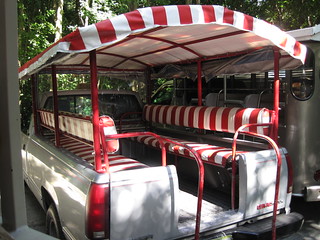OPINION—Imagine a summer with open-air taxis jetting about the City of Detroit and beyond.
Now, imagine that you’re riding in the back of one. Maybe it’s outfitted with red vinyl benches and a red and white striped awning, and you’re cruising along Jefferson Avenue, taking in the sites – Cobo Center, the Labor Legacy Monument, the Renaissance Center, glimpses of the People Mover sailing by the Millender Center.
But you are not People Mover material today. You are on the ground enveloped in fresh air. You are grooving to music tumbling out of the taxi speakers.
Passersby are unable to contain themselves as they wave and smile at your badass self. A soft breeze rolls off the Detroit River across your cheeks and through your hair, and you feel like a tourist in your own town.
Sound dreamy? You betcha.
But, couldn’t we make it work, structuring our Detroit summer taxi fleet on the taxi system used in the United States Virgin Islands? There, taxi drivers and taxi owners are one-in-the-same (removing the concept of owners making the profits and drivers making a small wage).
Owners retrofit pickup trucks – often Ford F450s – with bench seating, awnings to protect passengers from the sun, and steps for getting in and out of the vehicle.
Passengers pay a per person, per destination rate; the rates are clearly posted and standardized for all taxis. No gouging, no bargaining; the only cost that varies is how much the passenger decides to tip.
According to Judith Wheatley, executive director of the Virgin Islands Taxi Commission, USVI taxi drivers pay a modest annual fee of $130 for a business license, but they also must own a “medallion” to operate a vehicle for hire.
The medallions are either acquired by public auction ( income for Detroit’s burgeoning budget, perhaps?) or bought from a previous owner.
On the USVI, where taxi medallions are coveted, only two new medallions per island are offered up for auction by the Virgin Islands Taxi Commission each year, and those are currently designated only for veterans.
Last year, there were no bidders for St. John (bids opened at $20,000) or St. Croix (bids opened at $8,000); but both medallions were auctioned off for St. Thomas, one for $25,000 and one for $27,510.
 Making open-air taxi services possible
Making open-air taxi services possible
Now, to make the program work in Detroit, and make it affordable for more people, we could start our program small with maybe 10-15 taxi medallions issued for $2,000 to $5,000 each. A special financing program for the trucks and the medallions could be offered through a local bank or credit union.
We could adapt the USVI qualifications for licensing to Detroit, which might look like this:
- Must be a U.S. citizen or permanent resident alien.
- Cannot be younger than 21 or older than 65 if applying for the first time.
- Must have established a continuous and unbroken residence in the City of Detroit for one year (maybe more?) prior to licensing.
- Must have been a licensed driver for at least three years, unless a veteran.
- Must have a Michigan Chauffeur License and/or Michigan Commercial Driver License depending on the size of the vehicle and passenger capacity.
But that’s just the mechanics of how it could work. The creativity comes in imaging what purpose the taxis could best serve. Let us ponder:
- A tourist service, offering specialized taxi tours like riverfront and Belle Isle tours, urban garden tours, gallery tours, or microbrewery tours
- A downtown hop around, with office workers catching shuttles to Midtown, Mexicantown or Corktown for lunch or happy hour
- A Wayne State student service, taking students from campus to popular off-campus housing or recreation spots
- A hotel taxi, serving Detroit hotels and B&Bs
- A suburb connection, with routes to and from downtown along Gratiot, Woodward and Grand River, offering a comfy ride when the SMART bus is running late
Whatever the case, it’s nice to dream, even knowing that what is working in the Caribbean may not work here. Yet, as Detroit continues to get kudos for our creative problem solving from national and international press, why not leverage those vibes and show our ingenuity by establishing a funky, new transit system?
Have ideas on how open-air taxis could be used in southeast Michigan? Send them our way. We’ll consolidate them and ask Detroit Bus Company’s Andy Didorosi to weigh in.










